The Age of TV Jokers: Arab Media on the Brink
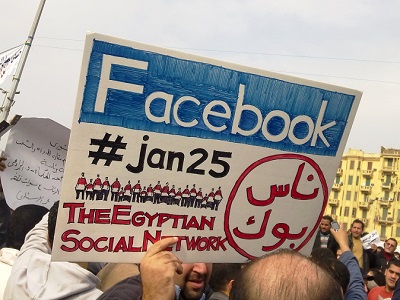
Social media is harder to control, for it remains a relatively free space. (Wikimedia)
By Ramzy Baroud
As I was finalizing my research for this article, I found myself browsing through a heap of hilarious videos by mostly Egyptian TV show hosts Tawfiq Okasha and Amr Adeeb.
In one of his numerous videos on youtube, Okasha, the star and host of the Cairo-based privately funded al-Faraeen channel, tries to explain the differences between the brains of humans and water buffalos. Along with Adeeb, they occupy a large space of Egyptian media discourse, wreaking so much havoc with their mostly unsubstantiated claims, frequent incite and outrageous claims.
Their demagogic discourse presented through daily campaigns of misinformation and vilification of those perceived to be enemies of the state is dangerous, especially when there is little room to counter these claims through critical thinking and sensible discussions. But what is interesting is that neither Okasha, nor Adeeb – and many others like them – were never meant to be entertainers per se, however entertaining they inadvertently may be.
In the last year or so in Egypt, much of what has been achieved in terms of carving space for alternative voices in the Egyptian media was quickly and decisively reversed. No matter how hard Bassem Youssef tried to tone down his satirical political message, he failed. His show, Al-Bernameg – The Program – came to an abrupt conclusion last June. “The current atmosphere isn’t fitting for a comedy show or any other show,” Youssef said last June.
“The current atmosphere” is damaging the freedom of expression in other Arab societies as well, more so in the last four years when popular upheavals took over several Arab countries, igniting unprecedented regional rivalries. Since then, the polarization of Arab media has reached extreme points. There is little room for opposing views and regimes are fighting an epic battle for survival by using every possible tactic to win, even if by deception, intimidation, or sheer lies.
It is not that media in Arab countries has been an example of transparency, equality and democracy – far from it. But, to an extent, there was a media evolution underway, dictated partly by the advent of the Internet and subsequent rise of social media, let alone the heated competition by pan-Arab satellite channels.
That evolution, if it were not violently interrupted by a brutal media war should have had some positive contributions. These are the rise of sociopolitical consciousness, affirmation of collective Arab identity, and, more importantly, the creation of a space where the Arab citizen, any citizen, could find room for self-expression free from the confines of government censorship and retribution of the state.
But now that the state, desperate to survive burgeoning popular pressures and massive mobilizations, began to appreciate the adverse repercussions from free media platforms, and began cracking down. It seems that the only space that remains open in the state-sanctioned media are those of the likes of Okasha and Adeeb.
At this critical stage of popular transformation, the stunting of critical Arab media will register its negative impact for years to come. To save themselves, some Arab regimes have chosen to sacrifice the intellect of their societies.
But the issue has its roots in a context that came much earlier than the Arab Spring.
In the post-colonial Middle East, Arab countries – especially those who suffered greatly under the reigns of western powers – were eager to knit separate identities for themselves that were neither French, Italian nor English. They sought regional allies among their own brethren, building cultural bridges where Arab radio stations and newspapers served as the medium of political and cultural unity.
Of course, that discourse too was manipulated to fit fantastic political ambitions, whether they were genuine – as ones fairly expressive of the will of Arab masses – or fabricated, as self-serving agendas by dictators or ruling classes.
The early attempts at pan-Arab media, however, were often used as platforms for regional Arab conflicts. In time, Arab rulers began understanding the immense value of owning and manipulating media to their advantage. And whenever possible, they censored, controlled and punished those who couldn’t be bought or refused to be censored.
The Iraqi invasion of Kuwait in 1991, argues Paul Cochrane, was a breaking point between attempts at manipulating and intimidating media, and owning it. The regional breakups that resulted from that war were so severe that they effectively ended the Arab Cooperation Council (ACC), an alliance that united Iraq, Jordan, Egypt and North Yemen. And they further strengthened another: the Gulf Cooperation Council (GCC). The latter had wealth, and that meant media access.
The post war brought a buying frenzy, where some rich Arab countries and wealthy businessmen attempted to consolidate their control over Arab public opinion by using newly founded satellite television stations and uniting various Arab societies around cheap entertainment.
When Al Jazeera was launched in 1996 and despite the fact that it was funded by a country which itself is not an icon of freedom of expression, a new type of competition rose between rival Arab countries. Other media soon sprang up that were also funded by rich Arabs and manned mostly by Arab intellectuals and journalists from poorer countries. In that new media realm, “freedom of expression” existed as long as they offered views, at least politically, matching the political agendas of the funders.
One cannot discount the fact that within that rivalry, independent journalists and intellectuals managed to navigate space for themselves, and by doing so pushed the boundaries of the debate like never before.
Then the Arab Spring started. Its decisive collective agenda (regime change) left no room for political bargaining or compromising. It further mixed up regional agendas, creating new alliances, and once more emphasized the power of the media in its ability to harness and sway public opinions. Even pan Arab news networks with a level of credibility, were soon tainted in their rush to influence the public discourse. The media split between geopolitical allegiances as each camp had its own funders and many propaganda arms.
Social media is harder to control, for it remains a relatively free space. However, it compels a degree of anonymity to its users, which opens up a whole new challenge in attempting to authenticate information through the endless stream of content and decipher genuine voices from that of government propaganda.
Though the media public discourse is severely restricted to some, it is generously open for others such as for those morally flexible intellectuals and media jokers who applauded the Israeli war on Gaza, as the rest of the world protested its devastating carnage. For now, Okasha and Adeeb will continue to take center stage, while thousands of brilliant voices of intellectuals and journalists are muffled and censored.
It is hard to imagine that in this age of awakening, such mockery will continue for too long.
– Ramzy Baroud is a PhD scholar in People’s History at the University of Exeter. He is a consultant at Middle East Eye. Baroud is an internationally-syndicated columnist, a media consultant, an author and the founder of PalestineChronicle.com. His latest book is My Father Was a Freedom Fighter: Gaza’s Untold Story (Pluto Press, London).
















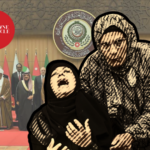
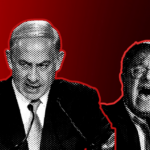
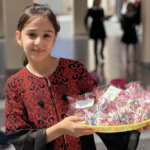
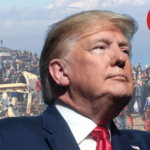
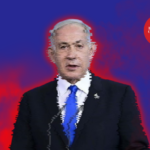
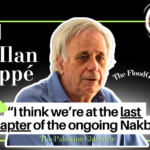
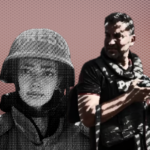
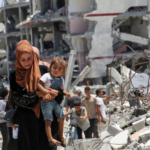

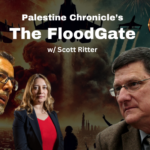









0 Comments